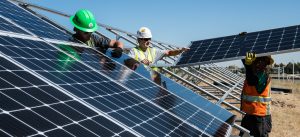UPDATE: The Illinois Commerce Commission sided with CUB and state solar advocates in a Dec. 2 ruling, asserting that Ameren’s calculations ended retail-rate net metering for solar customers too soon. Ameren will now return to retail-rate net metering and provide retroactive credits to any customers who might have been affected by the cutoff. Read CUB’s update.
You may have seen headlines this fall about Ameren Illinois’ solar policy. Here is CUB’s breakdown of the issue and what it means to solar customers.
what it means to solar customers.
What Happened?
There was action before the Illinois Commerce Commission (ICC) that impacts Ameren’s solar “net metering” policy.
Ameren Illinois electric customers who install solar panels on their property have the opportunity to sell excess power they produce back to their utility (Ameren) in a process called net metering. Up until now, that has led to credits equal to the amount of that excess power on both the delivery and supply sides of those customers’ electric bills.
Under the Future Energy Jobs Act (FEJA), once the load of Ameren’s net metering customers equals 5% of the total peak demand, the net metering benefit on the delivery side of bills ends for new customers. To be clear: People already getting this benefit on both the delivery and supply sides of bills will continue to do so. This change only impacts new solar customers after Ameren reaches the 5 percent threshold.
Those new customers will continue to enjoy net metering on the supply side of their bills, but instead of getting a net metering credit on the delivery side, they will get a one-time rebate, the amount of which will be determined.
Again: New and old net metering customers will continue to receive net metering credits on the supply side of their bill.
So what happened before state regulators?
Ameren informed the ICC that it had hit the 5 percent mark and would end delivery net metering for new residential solar customers, as of Oct. 3. However, solar installers and consumer/environmental advocates said that Ameren was incorrectly calculating the 5 percent by including net metering customers of alternative suppliers in the numerator but not the denominator, and that there was still time until the utility hit the threshold if this error were corrected. Ameren claims it is performing the calculation in accordance with its tariff.
So this is a dispute over whether Ameren’s tariff correctly implements the law, and it has now sparked two cases before the ICC: One (20-0389) is Ameren’s attempt to establish the rebate tariff that will be provided to new net metering customers instead of delivery net metering. Another (20-0738) concerns the question over whether Ameren’s tariff correctly interprets FEJA.
While the ICC looks into this to determine if Ameren’s calculations methodology is correct, new solar net metering customers (as of Oct. 3) will only see the net metering benefit on the supply side of bills. Depending on how the ICC rules, those customers will retroactively receive either the value of delivery-side net metering or the rebate.
What is CUB’s Stance?
CUB believes that Ameren is trying to end net metering prematurely. We are working with the ICC to resolve the issue, and we will alert consumers when the commission has finished its review of Ameren’s calculations.
What Does This Mean for Ameren solar customers?
This change only applies to NEW customers from October 3rd until a rebate value is determined, or until the Commission changes Ameren’s tariff and delivery net metering recommences until the 5 percent threshold is met. Current customers are being grandfathered in. So if before Oct. 3 you were an Ameren net metering customer, you will continue to enjoy net metering on both sides of your bill.
If you are a new net metering customer in Ameren territory as of Oct. 3 or after, you will not see the net metering benefits on the delivery side of your bill (at least until an ICC ruling, at which time, you could begin to receive those benefits or receive a rebate.)
When will the ICC rule on these cases?
The ICC is expected to make a final ruling on whether Ameren is correctly interpreting the Future Energy Jobs Act on Dec. 2. The rebate tariff could take longer, because it’s dependent on the other case being decided.
UPDATE: The Illinois Commerce Commission sided with CUB and state solar advocates in a Dec. 2 ruling, asserting that Ameren’s calculations ended retail-rate net metering for solar customers too soon. Ameren will now return to retail-rate net metering and provide retroactive credits to any customers who might have been affected by the cutoff. Read CUB’s update.

